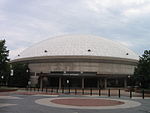Storrs, Connecticut
Census-designated places in Tolland County, ConnecticutMansfield, ConnecticutUse mdy dates from July 2023Villages in Connecticut

Storrs is a village and census-designated place (CDP) in the town of Mansfield in eastern Tolland County, Connecticut, United States. The village is part of the Capitol Planning Region. The population was 15,979 at the 2020 census. It is dominated economically and demographically by the main campus of the University of Connecticut and the associated Connecticut Repertory Theatre.
Excerpt from the Wikipedia article Storrs, Connecticut (License: CC BY-SA 3.0, Authors, Images).Storrs, Connecticut
Mansfield Road,
Geographical coordinates (GPS) Address Nearby Places Show on map
Geographical coordinates (GPS)
| Latitude | Longitude |
|---|---|
| N 41.808333333333 ° | E -72.249444444444 ° |
Address
Henry Ruthven Montieth Building
Mansfield Road 341
06269
Connecticut, United States
Open on Google Maps






